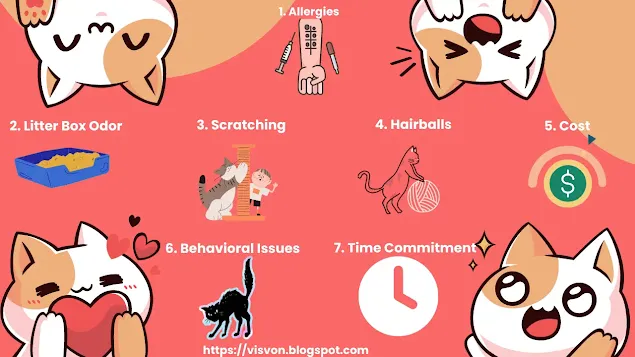The Drawbacks of Owning a Cat
- If you are a pet lover considering adopting a cat, you need to be aware of the potential downsides of cat ownership.
- In this article, we will discuss some of the common drawbacks of owning cats as pets that you should know before bringing one into your home.
- Welcome to Visvon's blog, where we share our knowledge and insights on various topics.
- We are excited to have you here and hope you find our articles informative and helpful.
- Let's get started and explore the world of learning and discovery together!
1. Allergies
- Cats can trigger allergic reactions, which can include sneezing, runny nose, itching, and watery eyes.
- According to the Asthma and Allergy Foundation of America, approximately 30% of people with allergies have allergic reactions to cats and dogs.
- Therefore, if you or someone in your household suffers from allergies, owning a cat may not be the best option.
Exotic Pets: How to Choose the Perfect Companion for You.
2. Litter Box Odor
- Cats are clean animals, but they produce a considerable amount of odor, mainly from their litter boxes.
- Failure to clean the litter box regularly can produce an unpleasant smell that can be difficult to get rid of.
- Additionally, some cats may not use their litter box properly, resulting in accidents around the house.
- This can be a significant concern for potential cat owners, especially those who have a sensitive sense of smell or live in smaller spaces.
3. Scratching
- Scratching is a natural behavior for cats, but it can be frustrating for owners when their furniture and carpets become the target.
- Scratching can also result in damage to walls and doors. Providing your cat with a scratching post can help reduce damage to furniture, but it may not eliminate the behavior entirely.
- This can be a significant drawback for potential cat owners who are concerned about the state of their home or have expensive furniture they do not want to be damaged.
4. Hairballs
- As cats groom themselves, they swallow a lot of hair, which can lead to hairballs.
- Hairballs are not only unpleasant to clean up, but they can also cause health issues for your cat.
- If your cat is prone to hairballs, it's important to take steps to prevent them, such as brushing them regularly and feeding them a hairball control diet.
- This can be a significant issue for potential cat owners who are concerned about the health and cleanliness of their homes.
5. Cost
- Owning a cat can be expensive, with ongoing costs such as food, litter, and veterinary care.
- Unexpected veterinary bills can also arise if your cat becomes sick or injured.
- The cost of owning a cat can add up quickly, and potential cat owners need to consider their budget before deciding to adopt.
- However, it's worth noting that adopting a cat from a shelter can be a more cost-effective option.
Pets: Cats vs. Dogs - Which is Better for Apartment or House Living?
6. Behavioral Issues
- Cats can exhibit various behavioral issues that can be challenging to address.
- These include aggression towards people or other animals, excessive meowing, and destructive behavior.
- While some of these behaviors can be corrected with training and behavior modification, others may require medical intervention.
- Potential cat owners need to be aware of the potential for behavioral issues before deciding to adopt a cat.
7. Time Commitment
- Cats may be known for their independence, but they still require a significant amount of time and attention.
- They need to be fed, groomed and played with regularly.
- Additionally, they require regular veterinary check-ups to ensure their health and well-being.
- If you don't have the time to devote to a pet, a cat may not be the best option for you.
- It's important to consider your lifestyle and schedule before adopting a pet to ensure that you can provide them with the care and attention they need.
a summary
- If you're considering adopting a cat, it's important to be aware of the potential drawbacks of cat ownership.
- By understanding the common issues that come with owning a cat, you can make an informed decision about whether a cat is a right pet for you.
- Remember to consider factors such as allergies, litter box odor, scratching, hairballs, cost, behavioral issues, and time commitment before bringing a cat into your home.
- With proper care and attention, cats can make wonderful pets and provide years of love and companionship.
In conclusion,
- owning a cat can be a wonderful experience, but it's important to be aware of the potential downsides before adopting.
- From the financial costs to the time and effort required for proper care, there are many factors to consider.
- However, with the right mindset and preparation, the rewards of feline companionship can far outweigh the challenges.
- If you found this article helpful, please share it with your friends and leave a comment below.
- And don't forget to subscribe to our blog for more informative articles on pet ownership.











.webp)
0 $type={blogger}:
Post a Comment